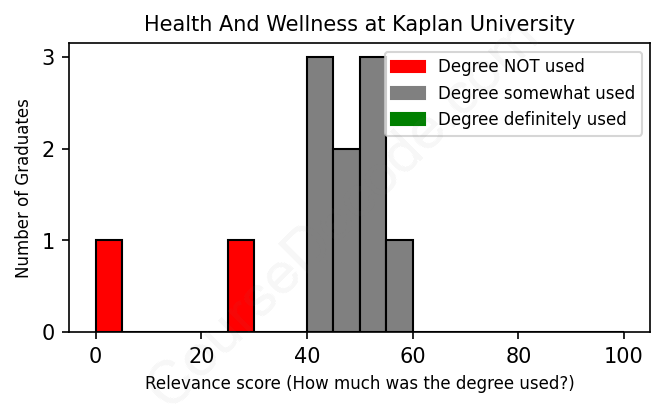
First, some facts. Of the Health And Wellness graduates from Kaplan University we've analyzed , here's how many have used (or NOT used) their degree in their career:

These are estimates based on AI analysis of 11 LinkedIn profiles (see below).
The verdict? Bad. Overall, with an average relevance score of 41%, Health And Wellness graduates from Kaplan University have a substantially lower likelihood (-26%) of finding work in this field compared to the average graduate across all fields:
And for comparison, here's the chart for all profiles we've looked at across all degrees.
Also, after graduating, 45% of these graduates have pursued further education other than another Bachelor's degree (such as a Masters degree or other), compared to the average across all profiles of 35%. This suggests you may need more than just a Bachelors degree to be competitive as a Health And Wellness graduate.
See the details:
|
Relevance score: 50% We think this person has gone into a career only somewhat relevant to their degree. We think this person has gone into a career only somewhat relevant to their degree.
DEGREE INFOGraduated in 2014 from Kaplan University with a Bachelors Degree in Health And Wellness. No other secondary education since. JOB HISTORY SINCE GRADUATIONAdministrative Assistant II Cleveland Clinic Jan 2019 - Present ABOUTNo information provided. |
The top 10 most common jobs done by the graduates we've analyzed (ranked most common to least) are:
After analyzing the various LinkedIn profiles of graduates from Kaplan University's Health and Wellness program, it’s clear that they ventured into a pretty diverse range of jobs. The most common roles seem to revolve around administrative positions, leadership roles in various organizations, and some direct health-related jobs like instructors or wellness coaches. While some graduates have secured positions that allow them to apply their health and wellness knowledge, such as Head Wellness Coach or Health Promotion roles, a substantial number ended up in jobs like administrative assistants or in the military, where the connection to health and wellness concepts is quite loose.
Overall, many of the jobs these graduates hold don’t directly relate back to their degree in Health and Wellness. Sure, there are a few that are very relevant, like instructors at community colleges and wellness coaches, but a lot of the roles are more focused on admin tasks, management, or even political leadership. So, if you’re considering a degree in Health and Wellness, it’s important to think about how you can leverage that education into relevant job opportunities or how to position yourself to stand out in a job market that often doesn’t align entirely with your field of study.
Here is a visual representation of the most common words in job titles for Health And Wellness graduates (this is across all Health And Wellness graduates we've analyzed, not just those who went to Kaplan University):

Looking at the career paths of graduates from Kaplan University who studied Health and Wellness, it's pretty clear that they start out in a mix of health-related roles and completely unrelated fields. A lot of graduates seem to kick off their careers with jobs that touch on wellness or health promotion, like fitness coaching or program coordination. However, there's a noticeable number who end up in administrative or support roles, which don't directly relate to their degrees. For example, some of them became administrative specialists or support assistants, and others went into sales or even political roles. It seems the start for many is a bit of a mix, with some finding that sweet spot in health and wellness while others drift towards jobs that could be considered unrelated.
Fast forward five to ten years, and there's a similar trend. Those who stuck closer to the health and wellness field generally find more stable and relevant positions, like wellness coaching or roles in health promotion. On the other hand, some graduates have veered quite far from their studies, working in roles that are admin-heavy or in vastly different industries. In essence, it feels like while many graduates find their way into satisfying careers within health and wellness, a significant number also end up in jobs that might not fully utilize their education. So, if you’re thinking about this degree, realize that there are plenty of paths you can take—some directly in line with health and wellness, and some that may take a different turn altogether.
Honestly, getting a Bachelor’s degree in Health and Wellness, whether at Kaplan University or somewhere else, is usually on the easier side compared to some other degrees. You’ll cover topics like nutrition, fitness, and holistic health, which can be pretty engaging if you’re into that stuff. The coursework often involves a mix of lectures, projects, and some practical work, but it’s generally designed to be accessible and supportive, especially if you’re motivated and passionate about the subject. Just like any degree, it takes effort, but if you’re ready to learn and participate actively, you should do just fine!
Most commonly, in the LinkedIn profiles we've looked at, it takes people 2 years to finish a Bachelor degree in Health And Wellness.
Looking at the career paths of these Kaplan University Health and Wellness grads, it seems like some have managed to snag decent roles, especially those working in administrative positions within government and healthcare. Roles like Protocol Officer and Admissions Director at healthcare centers generally come with some pretty solid salaries. However, others seem to be in more entry-level jobs or part-time gigs that might not be raking in the big bucks, like fitness coaching or being a sales associate. So, while some folks may be living pretty comfortably, others might still be grinding it out before they hit that sweet paycheck. Overall, it’s a mixed bag—some are doing well, and others are still climbing the ladder.
Here is a visual representation of the most common words seen in the "about" section of LinkedIn profiles who have a Bachelor degree in Health And Wellness (this is across all Health And Wellness graduates we've analyzed, not just those who went to Kaplan University). This may or may not be useful:

Here are all colleges offering a Bachelor degree in Health And Wellness (ordered by the average relevance score of their Health And Wellness graduates, best to worst) where we have analyzed at least 10 of their graduates:
| College | Score | Count |
|---|---|---|
 Kaplan University Kaplan University
|
41 | 11 |